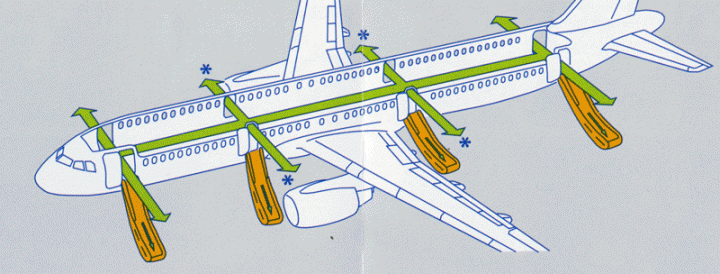
Shared under a Creative Commons license from Calle Macarone on Unsplash
I love flying. I love flying because I love travel – I want to see the world. But I love flying intrinsically for the experience of it too. It kind of feels like the closest I’ll get to space travel. Peering out the window, seeing collective human life in communities, cities and the provinces; roads, rivers and coastlines; a patchwork quilt of the urban and the agricultural mapped out over the curvature of the Earth. I love peering off into those curved horizons of our planet – our material Eternity. I always try to get the window seat. My window seat game is such that I’ll work out the direction that the plane will be flying, and the time of the day, to determine whether I can better catch a sunset or a sunrise by sitting on either the left of right hand side of the plane. And as such a flight can be, in and of itself, a transcendent experience.
These are two pictures I took earlier this month. The first landing in Istanbul in the hour or so before dawn:

The second is the sunrise over the Black Sea:

But I am also, at the same time, afraid of flying. Because it doesn’t come naturally does it? To be a wingless primate hurtling through the stratosphere – in virtually negligible air pressure, at minus 50 degrees - with no control over the process. If something mechanical in the car breaks down, most of the time you can just pull over and call the AA. If something mechanical in the plane breaks down, well, it’s a different story. Is it really worth it; to put oneself in mortal danger?

Shared under a Creative Commons license from https://www.evan-roth.com/photos/airline-safety-card/
Ok ok, I know rationally that the chances of dying in a plane crash are slim. I have a memory of Jim Carrey in Dumb and Dumber telling us that you’re more likely to die on the journey to the airport than during the flight. But the fear is not rational is it? Fears rarely are.
And so during our recent excursion, I started to observe my process – how I manage these two conflicting feelings about flying. There are things I tell myself – like my rational and my fearful side are bargaining to arrive at some compromise position. Such as:
· ‘This airline has never ever had a fatality – a 100% success rate. Those are pretty good odds’.
· ‘And even if we think about the all time statistics of flights – the odds of death are about 1 in 1.2 million. That’s a gamble I’m prepared to take’.
· ‘The most dangerous time is take off. Any mechanical failures are likely to present themselves at this stage’. So I really have the be ‘present’ and conscious whilst the plane is taking off – tracking its (mostly) smooth elevation into the sky... ‘Oh isn’t that pretty, to see the city from way up here? Ahh it’s ok we made it’.
But what if the engines suddenly cut out when we’re up there?
· ‘Well, the plane just won’t fall out of the sky – it’ll certainly glide for a time and then we can figure out how to land from there’.
But then turbulence strikes, this manmade contraption is juddering up and down, and I feel my heart doing flip flops:
· ‘I’ve had worse turbulence than this – there was that flight to Cincinnati when the woman next to me grabbed hold of me because she was frightened. And if that turbulence didn’t lead to a crash then this won’t.’
· Or ‘remember that news story when the plane landed at Heathrow and people had to be taken to hospital for injuries they sustained having been shaken around so much by the turbulence. If that turbulence didn’t kill them then this turbulence isn’t going to kill us!’
· And ‘anyway, look at the air hosts – do they look nervous? They’ve been through this turbulence 100 times before, they barely even notice it. When the hosts look nervous – that’s the time to worry!’
But this turbulence really is pretty wild just now isn’t it?
· ‘Well ok, fine, but if I died right now the life insurance would kick in, I’ve lived a good life, and will leave a good legacy.’
The worst of it is the thought that if I died on my travels then I’d leave the children without a father; I’d leave my family. I’d never see them again; they’d never see me again. I often think about that when I’m travelling with a pang of guilt and also the pain of our separation – like my priorities are wrong; that this excursion is an unjustifiable folly. But it’s an existential choice that we all take isn’t it? Where does the line fall where the risk is tolerable? Justifiable?
Somehow this combination of pseudo-rationalities gets me through. It’s a bit like a kind of mental judo that I go through in trying to deflect and contain the fear that I would be otherwise feeling. And it certainly helps that there are rewards for that risk taking. Which points to the importance of having a sense of direction; a purpose for the risk taking. If I don’t see the purpose then I won’t take the risk. So a question too for therapists when encouraging our clients to take a leap - is this consciously and coherently aligned with their own greater sense of direction and purpose? Is the risk worth taking?